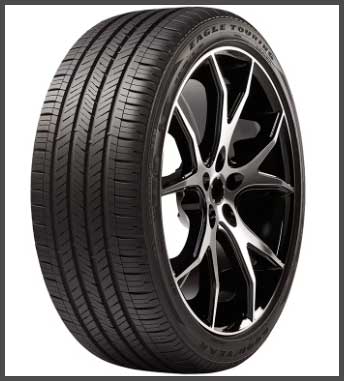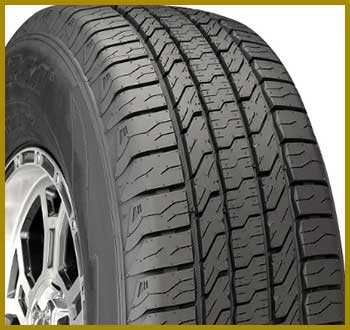One of the most vital components of a vehicle that often gets overlooked is the tires. These round rubber wonders make a world of difference in your driving experience.
When it comes to tire choices, touring and highway tires frequently find themselves in the spotlight, leaving many car owners debating: touring and highway tires.
Which is best for me?
This article will delve into their unique features, pros, cons, and even clear up some FAQs about these tire types.
A Side-By-Side Comparison Table
Here’s a table that illustrates the key differences between these two types of tires:
| Features | Touring Tires | Highway Tires |
| Best Suited For | Sedans, Coupes, Minivans, Small SUVs, Crossovers | SUVs, Light Trucks, Commercial Vehicles |
| Main Advantages | All-Season Capability, Quiet and Comfortable Ride, Better Handling and Braking | Durability, Longer Tread Life, High Load Carrying Capacity |
| Tread Design | More Sipes for Better Water Dispersion, Larger Outer Tread Blocks for Enhanced Cornering | Larger, Solid Tread Blocks for Durability, Fewer Sipes |
| Rubber Compound | Softer for Better Grip and Comfort | Stiffer for Enhanced Durability |
| Performance in Wet Conditions | Excellent due to Abundant Sipes | Good, but Can Be Limited due to Fewer Sipes |
| Snow Performance | Good, can Handle Light Snow | Variable, Depending on Tread Design |
| Noise Levels | Low, Offers a Quiet Ride | Higher due to Stiffer Construction and Tread Design |
| Price | Generally More Expensive | Generally Less Expensive |
| Tread Life | Good, but Can Vary Based on Driving Conditions | Excellent, Designed for Longer Life |
Touring Tires: Your Ticket to a Smooth Ride

Touring tires, also known as grand touring tires, are synonymous with comfort and quiet.
They’re designed for high-speed stability, good handling, and year-round performance, even in light snow.
Pros of Touring Tires
- Smooth and Quiet Ride: Touring tires offer superior comfort with reduced road noise, making them ideal for long journeys.
- All-Season Performance: They can brave different weather conditions, providing good traction in both dry and wet environments. The treads are designed to resist hydroplaning, making them safe for wet climates.
- Enhanced Handling: These tires offer exceptional handling and braking capabilities, ideal for drivers who want a sporty driving experience.
Cons of Touring Tires
- Pricey: Touring tires tend to be more expensive than other types due to their advanced engineering and materials,
- Reduced Tread Life: Though designed for durability, they may wear out faster than other tire types, especially when driven in more demanding conditions.
Highway Tires: The Reliable Road Warriors
Highway tires, on the other hand, are designed for SUVs, light trucks, and commercial vehicles. They are built for longevity and perform well under heavy loads.
Pros of Highway Tires
- Longevity: These tires have a longer tread life, thanks to their durable construction, ensuring they last for miles on end.
- Load Carrying Capacity: Highway tires are built for heavier vehicles and can handle more weight compared to touring tires.
- Cost-effective: Generally, they are less expensive than touring tires, offering a budget-friendly alternative for drivers.
Cons of Highway Tires
- Noise Levels: While highway tires are durable, they can produce more road noise than touring tires.
- Limited Weather Versatility: They perform well in dry conditions, but their wet and winter performance may not match that of touring tires.
Key Differences Between Touring and Highway Tires
Deciphering the distinctions between touring and highway tires requires an understanding of their individual characteristics. Their construction, design, application, and overall performance differ greatly, impacting their respective suitability for certain vehicles and driving conditions.
- The Anatomy of Touring Tires
Touring tires, often termed as grand touring or performance touring tires, are the jack-of-all-trades in the tire kingdom. They offer a seamless blend of good looks, performance, and all-season capability.

They’re designed to deliver a comfortable ride, coupled with reliable traction in dry, wet, or light snow conditions.
Touring tires are generally made from softer rubber compounds that contribute to their ride comfort and excellent traction capabilities.
They usually feature asymmetric or symmetric tread patterns, with larger tread blocks on the outer shoulder to enhance cornering grip.
The sipes, or thin slits across the tire surface, are numerous and meticulously designed to effectively channel water away, reducing the risk of hydroplaning.
Touring tires are often the go-to choice for mid-size sedans, coupes, minivans, small crossovers, and smaller SUVs. They are designed to absorb road irregularities, providing a smoother and quieter ride, which is a significant plus for long-distance drives.
- The Anatomy of Highway Tires
Highway tires are typically found on SUVs, light trucks, and commercial light trucks. They are designed with durability and longevity in mind, capable of withstanding heavier loads and frequent highway use.
Highway tires are constructed with stiffer rubber compounds, making them more robust and resistant to wear. Their tread design often includes larger, solid tread blocks with fewer sipes compared to touring tires. This design offers stability and robustness, but might limit their wet grip capability to some extent.
These tires are generally designed to have a higher load index compared to touring tires, meaning they are capable of carrying heavier weights without compromising tire integrity. This makes them well-suited for vehicles that are used for towing or hauling heavy loads.
Despite the focus on durability and load capacity, highway tires are not renowned for their quietness. The stiffer construction and tread design can result in higher road noise, particularly at higher speeds.
Also Read: Comparison of C Rated And E Rated Tires.
FAQ Section: Clearing Up the Tire Tangle
Now that we’ve examined the main characteristics, pros, and cons, let’s address some frequently asked questions about touring and highway tires.
Touring tires are designed for comfort, quietness, and versatile performance in various weather conditions. In contrast, highway tires are made for longevity and heavy-duty performance, often used on SUVs and light trucks.
Yes, touring tires are excellent for highway driving. They offer a smooth and quiet ride, making long drives more comfortable. However, for vehicles carrying heavy loads, highway tires may be a better choice.
Touring tires are used for various driving conditions and are ideal for drivers who desire a balance of good handling, year-round performance, and ride comfort. They are commonly found on sedans, minivans, small SUVs, and crossover vehicles.
While tire design can impact gas mileage, it’s not accurate to say that all touring tires universally provide better fuel economy than other tire types. Factors such as tire inflation, vehicle condition, and driving habits also play a significant role in gas mileage.
Final Thoughts
In conclusion, when choosing between touring and highway tires, consider your driving conditions, vehicle type, and personal preferences. Both tires offer unique benefits, and understanding these can help you make a decision best suited to your needs.
Remember, the right tire choice can significantly enhance your driving experience, safety, and comfort.


